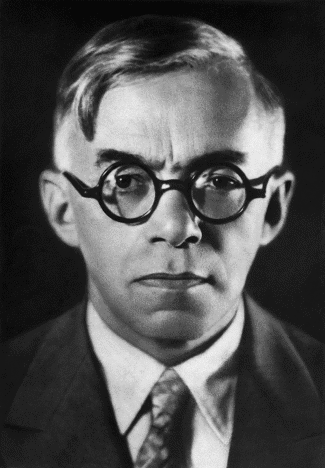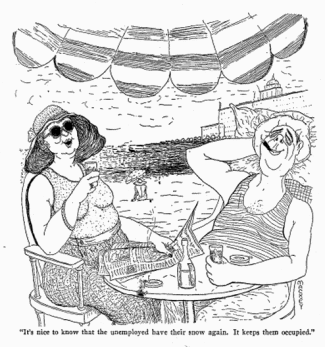Jewish Legion, by Wikipedia
Jewish Legion
by Wikipedia
7/28/2015
NOTICE: THIS WORK MAY BE PROTECTED BY COPYRIGHT
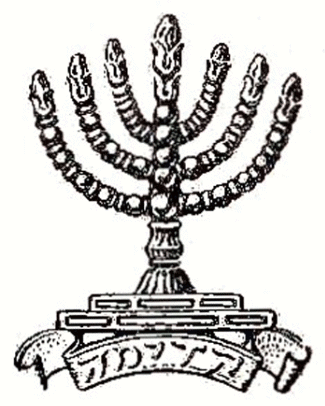
The cap badge of the First Judaeans 1919-1921: menorah and word קדימה Kadima

The Jewish Legion Veteran ribbon.
The Jewish Legion (1917–1921) is an unofficial name used to refer to five battalions of Jewish volunteers, the 38th to 42nd (Service) Battalions of the Royal Fusiliers, raised in the British Army to fight against the Ottoman Empire during the First World War.
Background
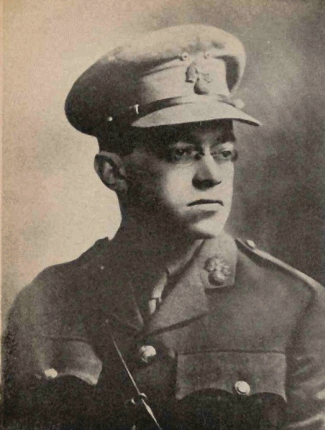
Jabotinsky in uniform
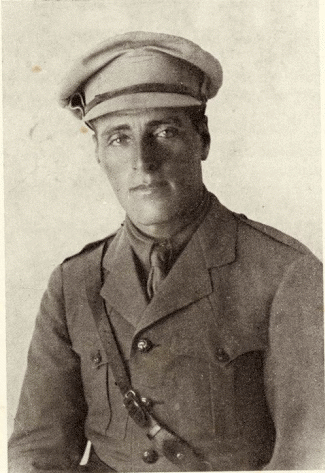
Trumpeldor in uniform
In February 1915, a small committee in Alexandria approved a plan of Zeev Jabotinsky and Joseph Trumpeldor to form a military unit from Russian Jewish émigrés from Palestine that would participate in the British effort to "liberate" Palestine from the Ottoman Empire.[1] The British commander General Maxwell met a delegation, led by Jabotinsky, on 15 March. The General said he was unable, under the Army Act, to enlist foreign nationals as fighting troops, but that he could form them into a volunteer transport Mule Corps.[2][1] Jabotinsky rejected the idea and left for Europe to seek other support for a Jewish unit, but Trumpeldor accepted it and began recruiting volunteers from among the Jews in Egypt who had been deported there by the Ottomans in the previous year.[1] The British Army formed 650 of them into the Zion Mule Corps, of which 562 served in the Gallipoli Campaign.[1]
Gallipoli Front
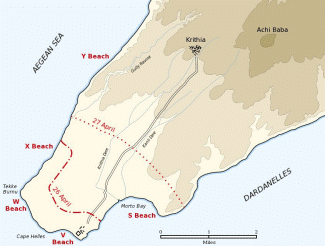
Cape Helles landing map
The need on the Gallipoli peninsula for means to carry water to the troops was considered so urgent that in mid-April, a request was forwarded to Egypt for the Zion Mule Corps to be sent immediately, regardless of its lack of equipment.[3] Its Commanding Officer was Lieutenant-Colonel John Henry Patterson, DSO, an Irish Protestant, and Captain Trumpeldor was Second-in-command; Jabotinsky served as an officer.[dubious – discuss] The Zion Mule Corps landed at Cape Helles from 27–28 April, four weeks after being raised, having been stranded at Mudros when its ship ran aground. The corps was embarked in the same ship as the Indian 9th Mule Corps bound for Gaba Tepe and so a detour to Helles was ordered. The Zion Mule Corps was disembarked under artillery fire from the Asiatic shore, with help of volunteers from the 9th Mule Corps and began carrying supplies forward immediately.[4]
A Distinguished Conduct Medal was awarded to Private M. Groushkowsky, who, near Krithia on 5 May, prevented his mules from stampeding under heavy bombardment and despite being wounded in both arms, delivered the ammunition.[5] Trumpeldor was shot through the shoulder but refused to leave the battlefield.[6] Patterson later wrote: "Many of the Zionists whom I thought somewhat lacking in courage showed themselves fearless to a degree when under heavy fire, while Captain Trumpeldor actually revelled in it, and the hotter it became the more he liked it ..."
The men returned to Alexandria on 10 January 1916. The Zion Mule Corps were disbanded on 26 May 1916. The Commonwealth War Graves Commission lists 13 members of the Zion Mule Corps as fatalities.[7]
Official formation
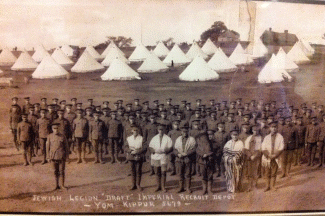
39th Battalion, Jewish Legion, at Fort Edward (Nova Scotia), Yom Kippur, 1918
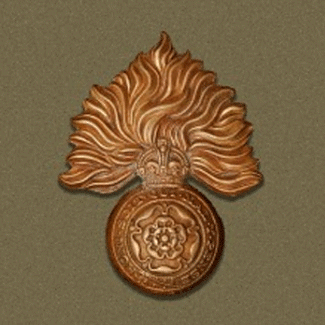
Badge of the Royal Fusiliers
Between the dissolution of the Zion Mule Corps and the formation of the Jewish Legion, Jabotinsky and Trumpeldor and 120 Zion Mule Corps veterans served together in 16 Platoon of the 20th Battalion, London Regiment.
Finally, in August 1917, the formation of a Jewish battalion was officially announced. The unit was designated as the 38th Battalion of the Royal Fusiliers and included British volunteers, as well as members of the former Zion Mule Corps and a large number of Russian Jews. In April 1918, it was joined by the 39th Battalion, raised at Fort Edward, Nova Scotia, which was made up almost entirely of Jews who were resident in the United States and Canada.[8]
Thousands of Palestinian Jews also applied to join the Legion and in 1918, more than 1,000 were enlisted. Ninety-two Ottoman Jews who had been captured in the fighting earlier were also permitted to enlist. This group was organized as the 40th Battalion. The 41st and 42nd Battalions were depot battalions stationed in Plymouth, England. In his memoirs about the Legion Jabotinsky described the composition of the 5000-member Legion as; "thirty-four per cent from the United States, thirty per cent from Palestine, twenty-eight per cent from England, six per cent from Canada, one per cent Ottoman war prisoners, one per cent from Argentina." The soldiers of the 38th, 39th and later the 40th Battalions of the Royal Fusiliers served in the Jordan Valley and fought the Ottomans north of Jerusalem.
Action in the Jordan Valley, 1918
In June 1918, the volunteers of the 38th Battalion began engaging the Ottomans some twenty miles north of Jerusalem. In the fighting in the Jordan Valley, more than twenty Legionnaires were killed, wounded, or captured, the rest came down with malaria, and thirty of this group later died. The Legion then came under the command of Major-General Edward Chaytor,[9] who commanded the ANZAC Mounted Division.
Besides various skirmishes, the Legion also participated in the Battle of Megiddo in mid-September, 1918, widely considered to have been one of the final and decisive victories of the Ottoman front.
The Legion's mission was to cross the Jordan River. Jabotinsky led the effort. Later, he was decorated and Chaytor told the Jewish troops: "By forcing the Jordan fords, you helped in no small measure to win the great victory gained at Damascus."
Legacy
Almost all the members of the Jewish regiments were discharged immediately after the end of World War I in November 1918. Some of them returned to their respective countries, others settled in Palestine to realize their Zionist aspirations. In late 1919, the Jewish Legion was reduced to one battalion titled First Judaeans, and awarded a distinctive cap badge, a menorah with the Hebrew word קדימה Kadima (forward) at the base.
Former members of the Legion took part in the defence of Jewish communities during the Riots in Palestine of 1920, which resulted in the arrest of Jabotinsky. Two former members of the Legion were killed with Trumpeldor at Tel Hai. One former member of the Legion was killed in Tel Aviv-Jaffa during the Jaffa riots of 1921. Some members of the Jewish Legion settled in moshav Avihayil. Another former member died in service in World War II.[11]
Gallery
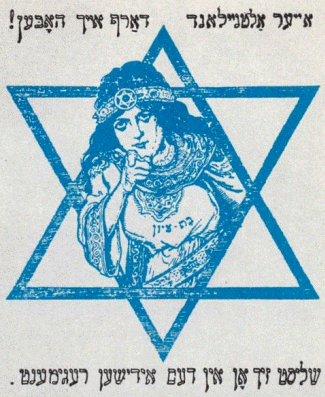
A recruitment poster published in American Jewish magazines. Daughter of Zion (representing the Jewish people): 'Your Old New Land must have you! Join the Jewish regiment.'
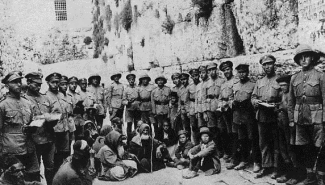
December 1917. Jewish Legion soldiers at the Western Wall after the British take-over of Jerusalem
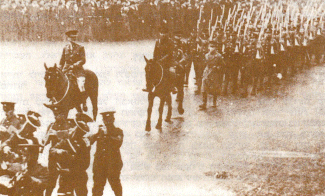
February 1918 The 38th battalion of the Jewish Legion marches in the streets of London.
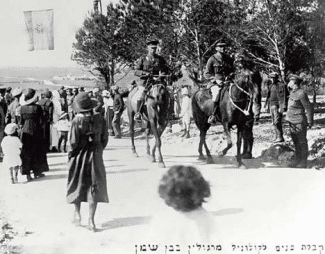
Col Margolin leading the 39th Battalion of the Jewish Legion through Bet Shemen
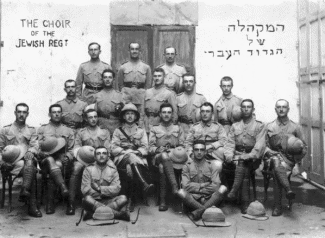
The Choir of the Jewish Legion
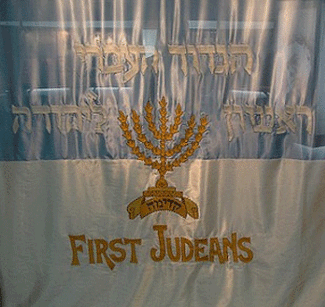
The flag of the First Judaeans 1919-1921.
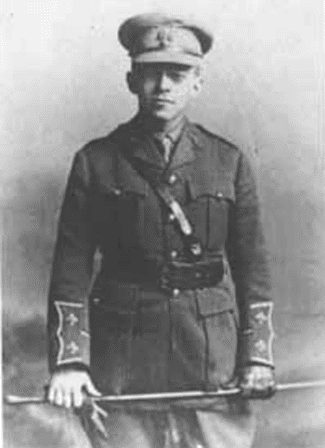
Lt. Jabotinsky in the uniform of the Royal Fusiliers
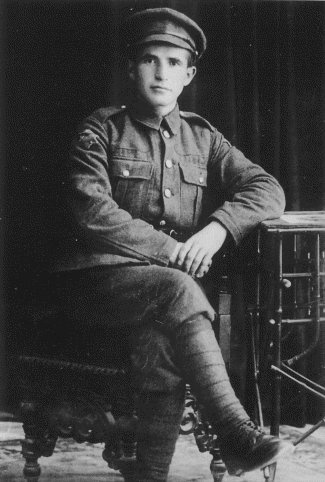
Private David Ben-Gurion, a volunteer in the Jewish Legion 1918
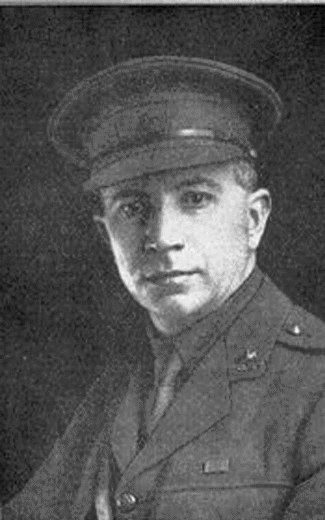
Colonel Eliezer Margolin of the "First Judaeans"
Members of Jewish Legion
Gershon Agron, Mayor of Jerusalem.
Nathan Ausubel, Jewish-American author.
Yitzhak Ben-Zvi, second Israeli President.
Yaakov Dori, Haganah leader; first Chief of Staff of the Israel Defense Forces.
Maxwell H. Dubin, rabbi, Wilshire Boulevard Temple, Los Angeles.
Sir Jacob Epstein, British sculptor.
Levi Eshkol, third Israeli Prime Minister.
Louis Fischer, Jewish-American journalist and author.
Eliyahu Golomb, founding member of the Haganah.
David Grün, later Ben-Gurion, first Israeli Prime Minister.
Nachum Gutman, Israeli Painter
Dov Hoz, Zionist activist, Haganah fighter.
Bernard Joseph, later Dov Yosef, Governor of Jewish Jerusalem during the 1948 siege; longtime Labor MK.
Berl Katznelson, Zionist philosopher and activist.
Reuven Katzenelson-Sgt under Joseph Trumpeldor at Battle of Gallipoli and father of Shmuel Tamir
Bert "Yank" Levy Internationalist in Spain and Military instructor for the British Home Guard, which served as the basis for a popular handbook on guerrilla warfare[12]
Gideon Mer,[13] physician, veteran of Zion Mule Corps, Jewish Legion and British Army in World War II. Served as medic in Israeli War of Independence; later worked in the Israeli Ministry of Health. {Note: he is the unnamed Officer during World War II in charge of anti-Malaria program mentioned in Martin Sugarman's article on the Zion Mule Corps}.
John Henry Patterson - Commander of Zion Mule Corps and 38th Battalion Royal Fusiliers
James Armand de Rothschild, D.C.M. Major, 39th Royal Fusiliers Battalion; Captain Royal Canadian Dragoons; a member of the Rothschild family.
Redcliffe N. Salaman, medical officer, since April 1918 in Egypt and Palestine, 38th Battalion, then 39th of Royal Fusiliers
Moshe Smilansky, Pioneer of the First Aliyah, a Zionist leader who advocated peaceful coexistence with the Arabs in Mandatory Palestine, a farmer, and a prolific author.
Edward Sperling - humorist and later director-general of the Ministry of Trade and Industry under the British Mandate of Palestine
Edwin Herbert Samuel, 2nd Viscount Samuel; CMG son of Herbert Samuel, 1st Viscount Samuel.
E. L. Sukenik, Israeli archaeologist; father of Yigael Yadin
References
1. Joseph B. Schechtman (1956). Rebel and Statesman, The Vladimir Jabotinsky Story, The Early Years. New York: Thomas Yoseloff. pp. 203–207.
2. "The Zion Muleteers of Gallipoli - Jewish Virtual Library". Retrieved 21 February 2015.
3. Aspinall-Oglander 1929, p. 122.
4. Alexander 1917, pp. 146–148, 154.
5. "Page 1062 - Issue 12828, 9 July 1915 - Edinburgh Gazette - The Gazette". Retrieved 21 February 2015.
6. Patterson 1916, pp. 210, 123–124, 204.
7. Reading Room Manchester. "CWGC - Find War Dead". Retrieved 21 February 2015.
8. EMAIL, Jewish Magazine. "the Jewish Legion and the Israeli Army". Retrieved 21 February 2015.
9. Bio of E.W.C. Chaytor (firstworldwar.com)
10. Approximate numbers, according to Commonwealth War Graves Commission
11. "Re: S/Sgt Maurice Spero died 27-8-1944". Retrieved 21 February 2015.
12. Levy, Bert "Yank"; Wintringham, Tom (Foreword) (1964) [1942]. Guerilla Warfare (PDF). Paladin Press. Retrieved April 15, 2014.
13. "Mer, Professor Gideon". Israel War Veterans League. Archived from the original on 2007-12-25. Retrieved 2008-03-12.
by Wikipedia
7/28/2015
NOTICE: THIS WORK MAY BE PROTECTED BY COPYRIGHT
YOU ARE REQUIRED TO READ THE COPYRIGHT NOTICE AT THIS LINK BEFORE YOU READ THE FOLLOWING WORK, THAT IS AVAILABLE SOLELY FOR PRIVATE STUDY, SCHOLARSHIP OR RESEARCH PURSUANT TO 17 U.S.C. SECTION 107 AND 108. IN THE EVENT THAT THE LIBRARY DETERMINES THAT UNLAWFUL COPYING OF THIS WORK HAS OCCURRED, THE LIBRARY HAS THE RIGHT TO BLOCK THE I.P. ADDRESS AT WHICH THE UNLAWFUL COPYING APPEARED TO HAVE OCCURRED. THANK YOU FOR RESPECTING THE RIGHTS OF COPYRIGHT OWNERS.

The cap badge of the First Judaeans 1919-1921: menorah and word קדימה Kadima

The Jewish Legion Veteran ribbon.
The Jewish Legion (1917–1921) is an unofficial name used to refer to five battalions of Jewish volunteers, the 38th to 42nd (Service) Battalions of the Royal Fusiliers, raised in the British Army to fight against the Ottoman Empire during the First World War.
Background

Jabotinsky in uniform

Trumpeldor in uniform
BROWN SHIRTS IN ZION: JABOTINSKY -- THE JEWISH HITLER
by Robert Gessner
February 19, 1935
The New Masses
The Zionist movement is a Jewish Nationalist movement aiming at the establishment of a "Jewish National Home in Palestine." It dates back to the eighties when as a result of a wave of pogroms in old Russia a movement known as the "Lovers of Zion" was established. Political Zionism, however, as it is represented by the present World Zionist Organization, dates back to 1897 when the first Zionist World congress took place in Basle, Switzerland, dominated and led by Dr. Theodore Herzl, a noted Austrian journalist. Dr. Herzl and his followers as late as 1914 were still striving to obtain a "charter" for Palestine from the Turkish Sultan. For this purpose Dr. Herzl sought the aid of the ambassadors and cabinet members of the various rulers of pre-war Europe, the Czar, the Kaiser, etc. A Jewish National Bank was established in order to "buy" Palestine from the Turkish Sultan.
Zionist diplomacy went on the rocks with the birth of the Young Turkey movement in 1908 and with the overthrow of the Sultan in 1910. It was only during the World War, when the British government issued the Balfour proclamation proclaiming Palestine a Jewish National Home in order to win the Jewish masses to the Allies' side that the Zionist movement obtained a new lease on life. The British government, however, generously promised Palestine to the Arabs as well. As a means of drawing in the Arab masses in its war against Turkey, England assured the Arabs that Palestine would be part of a United Arabistan.
This double dealing has had its consequences in a number of racial outbreaks in Palestine. The British government, which still holds the League of Nations mandate over Palestine, is seeking to retain the balance of power and to appear as the "protector" now of the Arabs, now of the Jews. It has been claimed by the Zionists that the outbreaks of August, 1929, when numerous Jews and Arabs were killed, were to a great extent fomented by British agents. The League of Nations recently made a blunt declaration that Palestine will never become a Jewish National Home under the mandate.
A section of the Zionist movement -- the Revisionists -- led by Vladimir Jabotinsky has been accusing the parent Zionist body of playing England's game in Palestine instead of realizing the Herzl objective: the establishment of a Jewish State. The Revisionists have been urging defiance of Great Britain. They aim to secure this Jewish State by force, through organizing the Jewish youth into fascist bands. Jabotinsky recently arrived in the United States in order to gain a favorable hearing for the Revisionist program.
The Jewish members of the revolutionary movement have always fought Zionism as detrimental to the interests of the Jewish masses. A number of their reasons may be formulated as follows:
Zionism is a tool of British imperialism which needs Palestine for its own purposes;
Zionism is dispossessing the Arab peasants and is conducting a colonization by conquest with the aid of British bayonets;
No nation can solve its problems by emigrating to another country, even if Palestine were not so small and so thickly populated;
Zionism draws away the attention of the Jewish masses from the problems of the countries where they live;
Zionism separates them from the masses of other nationalities;
As a chauvinist movement it is a breeding ground for fascism. -- THE EDITORS.
***
HE WAS an ordinary Brown Shirter. Sitting in a cafe in Berlin I asked him, "Why don't you allow the Jews to participate in this reconstruction of the Fatherland?" His ordinary face showed a slight disgust at the naivete of my question. "Jews," he said, "are not Germans. Let them build up their own fatherland."
This is what 300,000 of them are attempting to do today in Palestine. Zionism is the nationalist movement of the Jews. A few have gone to await the second coming of Moses; they may be called Religious Zionists. Many have gone to make money at orange-growing or apartment-house-building; they are Capitalist Zionists. Others have gone to live communally on farms; they are Socialist Zionists, and since these are the Socialist Nationalists of the Zionist Movement they may be partially described as Pink Nazis. The Nationalist Socialists on the other hand are the Revisionists, or the Brown Nazis of Palestine. They believe in the Jewish State 100 percent, with their own Jewish army and even, I might add, a Jewish navy on the Dead Sea! The Fuehrer of the Brown Nazis in Palestine is Vladimir Jabotinsky.
Jabotinsky was born in Eastern Europe, where, it is said, "we have always for the past fifty years thought in terms of nationalism." The Zionist movement had its first following among Eastern European Jews, and today they remain the strongest adherents to the nationalist creed of Zionism. Jabotinsky was a member of Allenby's Jewish Legions that marched into Jerusalem after the departure of the Turks. Today the young, stern-faced legionnaires of Jabotinsky march through the streets and wear shirts, like their nordic brothers in Germany. In Poland I had seen them marching through the streets (side streets in the ghettoes) singing "Poland for Pilsudski, Germany for Hitler. Palestine for Jews --"
From the halo that his young legionnaires had painted about his head I had imagined Jabotinsky to be tall, angular, a Russian giant. From his oratorical reputation I had expected long, expressive hands. Upon returning to America after seven months of observing Jews in Europe, Asia and Africa I heard that Jabotinsky was on board the liner, en route to America for a lecture tour. I climbed to the first class for an interview.
Jabotinsky is no Kerensky. He is a short, squatty, unattractive man. He has large, dark eyes, a snub nose, enormous lips with the lower one protruding and a jaw that acts like the lower lip. His face slants outward, like the Neanderthal Man's.
Vladimir Jabotinsky
He announced he would speak frankly, so that Revisionism would be made clear. The skin under his eyes contracted, his lower lip went out, the jaw stiffened. "Revisionism," he began, "is naive, brutal and primitive. It is savage. You go out into the street and pick any man -- a Chinaman -- and ask him what he wants and he will say 100 percent everything. That's us. We want a Jewish Empire. Just like there is the Italian or French Empires on the Mediterranean, we want a Jewish Empire."
When I inquired into the method of securing this Jewish Empire his voice became hard and determined. "We will take no no for an answer. In your universities in America you teach that a gentleman accepts no for an answer. Well, we don't."
Jabotinsky's idea is to keep asking the English to allow him to have a Jewish Empire until the English are so groggy from saying no that in a semi-conscious condition they will feebly nod their heads in consent. This logic is based upon the belief that English diplomacy is flighty, that is, saying no to everything and then coming around to yes when they have admitted their error.
"After you've gotten the Jewish Empire," I continued, "what is it to be?"
"Palestine is to be the homeland for ten or twelve million Jews."
Palestine is, incidentally, a two-by-four country, two hours wide and four hours long by auto. The 900,000 Arabs have been long complaining, and official England is agreeing, that the 300,000 Jews are making life an unbearable sardine box. Land values have skyrocketed overnight. Dunams, which are about one-fourth of an acre, have already sold for as high as $5,000. Into this sardine box Jabotinsky means to stuff ten or twelve millions Jews. I asked what about the sixteen million in all the world. He answered that in the remaining four million he was frankly not interested! A Jewish Empire of ten or twelve million suited him.
Jabotinsky's empire, like all other empires, has territorial desires. Jabotinsky's opposition to the Jewish Agency, which is the administrative office of the World Zionist Organization, crystalized into the founding of the Revisionist Party over the question of Transjordania. Following the Arab riots of 1920 and 1921 against Jewish colonization, Winston Churchill, then Secretary for the Colonies, wrote one of those famous White papers. To appease the Arabs he divorced Transjordania from Palestine and set it up as a mandatory territory by itself with its own parliament and ruler. The Jewish Agency acquiesced to this bill of divorcement. Jabotinsky, at that time an executive member in good standing in the Agency, refused to stomach this "betrayal" of his compatriots, and consequently launched himself against Dr. Chaim Weizmann, Ben Gurion and the other Agency Judases.
Revisionism is not the proper title for his party, the Fuehrer believes. He explained that the question of a name came up at the hurried last session of his first world congress, when it was decided the last minute to call themselves revisionists because they were for a revision. But personally he believes the title should have been the Jewish State Party. I suggested Fundamental Zionists.
"Yes, we are the pure Zionists," he answered. "We go back to the first Zionists. Herzl was a Revisionist. He believed in the Jewish State."
The German Fuehrer, to establish ancestral purity for his party, called Christ a nordic!
The Jewish Fuehrer believes that since the the time of Herzl, the nineteenth-century inventor of Zionism and the First Revisionist, there have been compromises, with the result that the goal has not been attained. "But I will make no compromises," he said. "I believe in the upbuilding of the Jewish State at any cost. If we must invest three or four generations in this upbuilding then that must be done."
"But in the capitalist economy, which as you know is the basic and ruling economy of Palestine," I asked, "which class of this three or four generations is going to be sacrificed in the upbuilding of a bourgeois society?"
"It will be the workers," he admitted. "But if the Jews accept going to Palestine in the first place, then they must expect to starve, be ready to starve for the sake of the Jewish State. There must be no strikes, because strikes are monkey-wrenches thrown into the machinery reconstructing the Jewish State."
Having heard Jabotinsky's plan to control labor, I asked about the sacrifices of capital for the sake of the fatherland.
"Oh," he said, "capital and labor must suffer alike." He said this so glibly.
On this point the Jewish Fuehrer agrees with the Italian Fuehrer. This cardinal point of Jabotinsky's Corporate Jewish State was recently accepted by the Jewish Labor Party. Those "Pink Nazis," known as the Histadrut or the Jewish Federation of Labor, signed an agreement with Jabotinsky. Histadrut, which has a monopoly of control over 80 percent of all Jewish workers in Palestine, is run by its majority party, the MAPEI or Socialist Zionist Party, which is affiliated with the Second International. The Revisionists are not members of the Jewish Federation of Labor, which numbers 60,000 workers; the Revisionists have about 1,000, who are in great demand by employers, having been forbidden to strike by their Fuehrer. The Revisionists break up strikes inaugurated by Histadrut workers; there is no love lost or found between the factions. The Revisionist youth learn their strike-breaking tactics in semi-military camps, often located beside a Histadrut agricultural commune.
"I do not know why Ben Gurion [leader of MAPEI] signed the agreement," Jabotinsky answered my question. "But to me it was a great advantage, because we are weak and a minority. The Labor Party by warfare could limit us, refuse us entry certificates for our immigrants [The Palestine Government controls Jewish labor immigration by issuing limited entry certificates to the Jewish Agency for distribution]. But the Labor Party has agreed to our principle of obligatory arbitration in questions of pending strikes."
Many of the young workers in Histadrut are disgruntled with this Ben Gurion peace treaty, claiming that he sold out just when they had the Revisionists licked. Undoubtedly the Brown Nazis have been given a new lease on life by the Socialist-Zionists, just as they were given a new lease time and again by the Social Democrats in Germany. It must be remembered that MAPEI is affiliated with the Second International.
Is Jabotinsky grateful for his reprieve? "But," added the Fuehrer, "there can be no coordination between us."
Jabotinsky believes the socialist ideology unacceptable for Palestine. The "communist" colonies are "interesting but too expensive," and are "too small and scattered to have any consequence on the economic structure of Palestine." He pointed out that of the 60 odd million pounds that have been invested in Palestine only eight million have been National Fund money. Private factories, not agricultural "communist" colonies, will allow more workmen to enter and find employment. Consequently, he believes in the system already in action, namely, capitalism.
While in Tel Aviv I called on Jabotinsky's first lieutenant, Ben Horin, for an explanation of the tenets of Revisionism, since his Fuehrer was at that time not allowed to reside in the embryo Jewish State by the dictators of the more mature Empire of Britain. Ben Horin, who runs a news agency and who may be described as the Goebbels of the movement, was even more outspoken than his Fuehrer on capitalism for Palestine. "The capitalist is always in the right," he said, "because he creates jobs for Jews."
The divine right of kings had nothing on the divine right of capitalists in Palestine, because they are, ipso facto, ordained by Moses to prepare the earth for the Second Coming of the Messiah!
"The exploitation of labor," said Ben Horin, "is approved by the principle that it is aiding the establishment of the Jewish State. It is not a question of the standard of living of the Jews in the Jewish State, but of the number of Jews in the State."
The anti-labor ideology of the Revisionists stems from their common hatred of Communism. Most of them left Russia for Palestine during the years of and immediately following the Civil War.
In answer to my question of how he planned to assist the establishment of capitalism in Palestine Jabotinsky outlined his plan. First, to demand of the British tariffs to protect industry. [Palestine is a mandated country free of tariffs although certain duties of a 12 percent level have been levied.] Secondly, to demand a geological survey of waste lands to see what minerals are there for exploitation. Thirdly, to have the Palestine Government control all land settlement, instead of the Zionist Agency.
Of the practical economic future the Fuehrer was frankly stumped. "If the robot comes to Palestine we are finished. The robot will make the proletarians an obsolete class."
"The robot?" I repeated, getting very concerned about this liquidation of the proletariat. "What do you mean?"
"Technocracy, the American brand," he replied.
"Oh," I sighed, relieved. The Palestine proletariat were still safe.
"If technocracy comes to Palestine we are finished, but I do not mention any of that when I make propaganda in my speeches. I am concerned only with the Jewish State."
The American audiences of Jabotinsky will be spared a discussion on technocracy, but will not be barred from hearing the fascist refrain, the magic cure-all: the Jewish State.
"Where do 900,000 Arabs fit into the Jewish State?" I asked.
"In the colonization of any country," the Fuehrer said sadly, "the native has always suffered. There can be no Arab state if there is to be a Jewish State. In the Jewish State we would guarantee them the same rights Jews are guaranteed in other states."
A novel idea. The Arabs under the Jewish State are to be held hostages for all the remaining Jews in the Diaspora, the four million that Jabotinsky is frankly not interested in!
The Fuehrer believes there can be no compromises on the Arab question. "The dickering of Dr. Weizmann and Ben Horin is futile," he said. "You can't buy off the Arab with backshish [an Arab word meaning a tip.] The Arab can understand reason only when we have enough armed Jewish youths to lick him."
After disposing of the Arabs as so many American Indians Jabotinsky attacked the English as idiotic. Inasmuch as they are too dumb to protect the Jews Jabotinsky proposes to do it himself. "If Palestine can be settled peacefully -- all right," he said, "but I say let there be Jewish legions in the British Army in Palestine. I will supply the men and arms."
Jabotinsky was quick to add that he was not anti-British. In all the years previous Jabotinsky has been notorious for his belligerent, uncompromising attack on England. Now he talks like any other diplomat. "We have the same point of view as Britain, even if she doesn't know it. It is best for her to have a highly organized, cultural society, obligated to her because of having received its national opportunity from her, residing on the borders of the Suez Canal."
I reminded the Fuehrer that Palestine does not border the Suez Canal, but that the Canal is in an Arab national territory, Egypt. The Fuehrer made a gesture which was meant to sweep away boundary lines. Having disposed of the south I asked him next how would the expansion of a Jewish State in the north not come into conflict with England's oil pipeline.
"Ah, Haifa," the Fuehrer began, "will be the largest port on the Mediterranean. There will be a new breakwater from Haifa to Acre -- it will make a harbor as large as the Solent." In his enthusiasm he pictured a new Jewish harbor destined to make shadows of Alexandria, Gibraltar, Marseilles, Genoa, Trieste, Venice, Naples and even Constantinople.
Jabotinsky considers his Jewish State the sole protector of Britain's highway to her imperial interests in the Indian and Pacific Oceans. England has no land on the Mediterranean, he speculates, except Gibraltar, which will recede to the Spanish; and the island of Cyprus, which he claims England offered to give back to the Greeks after the war but they won't take it. In his new role of diplomat Jabotinsky forgets that there was a revolt in Cyprus to return to Greece, which the British suppressed; and he also forgets the existence of the naval station at Malta, and that the British have soldiers and airplanes already stationed along the oil line, and in Egypt are quartered 11,000 Tommies, almost as many as the whole Egyptian army. Under the pretense of being England's Mediterranean watchdog Jabotinsky dreams of a Jewish Empire expanding into Egypt to take over the Suez Canal and expanding into Iraq in order to protect the highly valuable oil line.
Jabotinsky's underhand ideology for achieving his goal is no recent tactic. His hatred of the Bolsheviki drove him in 1921 to sign a pact of military co-operation with the White Guard, Ukrainian Nationalist and notorious pogrom-maker, Petlura. Jabotinsky told me that he "would be as proud today as I was then to sign such an agreement."
The Fuehrer of the Jewish Brown Shirt Legions explained his signature as follows:
Petlura had in 1921 15,000 soldiers in a Polish camp waiting for French support in order to attack Soviet Ukraine. Slavinsky, Petlura's foreign minister, called on Jabotinsky who was in Prague at that time. "No more proclamations," Jabotinsky told him. "I or no one else will believe them. There must be some action, not words." To protect the Ukrainian Jews Jabotinsky proposed to organize and arm a Jewish gendarmerie to follow in the rear of Petlura's army and after a Jewish town has been captured protect its population from pogroms.
I pointed out that it had been Petlura himself who had conducted the bloody pogroms on all of his expeditions into the Ukraine. "No," the Fuehrer disagreed, "I don't believe Petlura himself was anti-semitic. He came from a healthy, peasant stock. It was his soldiers who got out of control."
Jabotinsky was and is today proud of having signed a co-operative pact with a general who he admitted had no control over his own pogrom-rioters, while on the other hand the Jewish villages, that he purported to be the protector of, were at that time under the Bolsheviki who had already guaranteed and protected Jewish lives and property. At that time the Bolsheviki had been victorious on all the invaded fronts and had even signed a peace treaty with England. Stability was recognized when France in the same year withdrew her support of Petlura. Why then didn't Jabotinsky in his desire to safeguard the Jews support the Bolshevik Government at a time when it stood in the least possibility of being overthrown? Instead he signed a co-operative pact with a non-existing government, the Ukrainian Nationalists, the leader of which was in Poland, not in the Ukraine. Jabotinsky obviously was more interested in overthrowing the Bolsheviki than in protecting Jews. In fact his plan meant the sacrifice of Jews. Can anyone imagine a Jewish gendarmerie following in the rear and not being drawn into battle, or not being forced to do so by Petlura's uncontrolled bandits? Or can anyone imagine Petlura's pogrom-seasoned brigands being refused their prey by a handful of inexperienced Jewish youths, who had been placidly observing them while they drove off the defenders of the village?
Jabotinsky, because he said he would sign a similar pact today and be proud of it, is more interested in overthrowing the Soviet Government than in protecting Jews. In answer to my question he said he was not interested in whether anti-semitism has been abolished in the Soviet Union. Nor was he interested in the Jewish colonies in Russia. He counts out -- for the present -- the two million Russian Jews [I corrected him in that they are really three million but he insisted on the two] because he doubts if the government is economically sound.
The Fuehrer of the Brown Shirted Legions of Judaism is in America because "Revisionism is the genuinest proletarian movement in the world in that it is the poorest." In America about one percent of the Jews are Zionists. What fraction of another one percent will donate money to the Jewish Hitler?
In February 1915, a small committee in Alexandria approved a plan of Zeev Jabotinsky and Joseph Trumpeldor to form a military unit from Russian Jewish émigrés from Palestine that would participate in the British effort to "liberate" Palestine from the Ottoman Empire.[1] The British commander General Maxwell met a delegation, led by Jabotinsky, on 15 March. The General said he was unable, under the Army Act, to enlist foreign nationals as fighting troops, but that he could form them into a volunteer transport Mule Corps.[2][1] Jabotinsky rejected the idea and left for Europe to seek other support for a Jewish unit, but Trumpeldor accepted it and began recruiting volunteers from among the Jews in Egypt who had been deported there by the Ottomans in the previous year.[1] The British Army formed 650 of them into the Zion Mule Corps, of which 562 served in the Gallipoli Campaign.[1]
Gallipoli Front

Cape Helles landing map
The need on the Gallipoli peninsula for means to carry water to the troops was considered so urgent that in mid-April, a request was forwarded to Egypt for the Zion Mule Corps to be sent immediately, regardless of its lack of equipment.[3] Its Commanding Officer was Lieutenant-Colonel John Henry Patterson, DSO, an Irish Protestant, and Captain Trumpeldor was Second-in-command; Jabotinsky served as an officer.[dubious – discuss] The Zion Mule Corps landed at Cape Helles from 27–28 April, four weeks after being raised, having been stranded at Mudros when its ship ran aground. The corps was embarked in the same ship as the Indian 9th Mule Corps bound for Gaba Tepe and so a detour to Helles was ordered. The Zion Mule Corps was disembarked under artillery fire from the Asiatic shore, with help of volunteers from the 9th Mule Corps and began carrying supplies forward immediately.[4]
A Distinguished Conduct Medal was awarded to Private M. Groushkowsky, who, near Krithia on 5 May, prevented his mules from stampeding under heavy bombardment and despite being wounded in both arms, delivered the ammunition.[5] Trumpeldor was shot through the shoulder but refused to leave the battlefield.[6] Patterson later wrote: "Many of the Zionists whom I thought somewhat lacking in courage showed themselves fearless to a degree when under heavy fire, while Captain Trumpeldor actually revelled in it, and the hotter it became the more he liked it ..."
The men returned to Alexandria on 10 January 1916. The Zion Mule Corps were disbanded on 26 May 1916. The Commonwealth War Graves Commission lists 13 members of the Zion Mule Corps as fatalities.[7]
Official formation

39th Battalion, Jewish Legion, at Fort Edward (Nova Scotia), Yom Kippur, 1918

Badge of the Royal Fusiliers
Between the dissolution of the Zion Mule Corps and the formation of the Jewish Legion, Jabotinsky and Trumpeldor and 120 Zion Mule Corps veterans served together in 16 Platoon of the 20th Battalion, London Regiment.
Finally, in August 1917, the formation of a Jewish battalion was officially announced. The unit was designated as the 38th Battalion of the Royal Fusiliers and included British volunteers, as well as members of the former Zion Mule Corps and a large number of Russian Jews. In April 1918, it was joined by the 39th Battalion, raised at Fort Edward, Nova Scotia, which was made up almost entirely of Jews who were resident in the United States and Canada.[8]
Thousands of Palestinian Jews also applied to join the Legion and in 1918, more than 1,000 were enlisted. Ninety-two Ottoman Jews who had been captured in the fighting earlier were also permitted to enlist. This group was organized as the 40th Battalion. The 41st and 42nd Battalions were depot battalions stationed in Plymouth, England. In his memoirs about the Legion Jabotinsky described the composition of the 5000-member Legion as; "thirty-four per cent from the United States, thirty per cent from Palestine, twenty-eight per cent from England, six per cent from Canada, one per cent Ottoman war prisoners, one per cent from Argentina." The soldiers of the 38th, 39th and later the 40th Battalions of the Royal Fusiliers served in the Jordan Valley and fought the Ottomans north of Jerusalem.
Action in the Jordan Valley, 1918
In June 1918, the volunteers of the 38th Battalion began engaging the Ottomans some twenty miles north of Jerusalem. In the fighting in the Jordan Valley, more than twenty Legionnaires were killed, wounded, or captured, the rest came down with malaria, and thirty of this group later died. The Legion then came under the command of Major-General Edward Chaytor,[9] who commanded the ANZAC Mounted Division.
Besides various skirmishes, the Legion also participated in the Battle of Megiddo in mid-September, 1918, widely considered to have been one of the final and decisive victories of the Ottoman front.
The Legion's mission was to cross the Jordan River. Jabotinsky led the effort. Later, he was decorated and Chaytor told the Jewish troops: "By forcing the Jordan fords, you helped in no small measure to win the great victory gained at Damascus."
Legacy
Almost all the members of the Jewish regiments were discharged immediately after the end of World War I in November 1918. Some of them returned to their respective countries, others settled in Palestine to realize their Zionist aspirations. In late 1919, the Jewish Legion was reduced to one battalion titled First Judaeans, and awarded a distinctive cap badge, a menorah with the Hebrew word קדימה Kadima (forward) at the base.
Former members of the Legion took part in the defence of Jewish communities during the Riots in Palestine of 1920, which resulted in the arrest of Jabotinsky. Two former members of the Legion were killed with Trumpeldor at Tel Hai. One former member of the Legion was killed in Tel Aviv-Jaffa during the Jaffa riots of 1921. Some members of the Jewish Legion settled in moshav Avihayil. Another former member died in service in World War II.[11]
Gallery

A recruitment poster published in American Jewish magazines. Daughter of Zion (representing the Jewish people): 'Your Old New Land must have you! Join the Jewish regiment.'

December 1917. Jewish Legion soldiers at the Western Wall after the British take-over of Jerusalem

February 1918 The 38th battalion of the Jewish Legion marches in the streets of London.

Col Margolin leading the 39th Battalion of the Jewish Legion through Bet Shemen

The Choir of the Jewish Legion

The flag of the First Judaeans 1919-1921.

Lt. Jabotinsky in the uniform of the Royal Fusiliers

Private David Ben-Gurion, a volunteer in the Jewish Legion 1918

Colonel Eliezer Margolin of the "First Judaeans"
Members of Jewish Legion
Gershon Agron, Mayor of Jerusalem.
Nathan Ausubel, Jewish-American author.
Yitzhak Ben-Zvi, second Israeli President.
Yaakov Dori, Haganah leader; first Chief of Staff of the Israel Defense Forces.
Maxwell H. Dubin, rabbi, Wilshire Boulevard Temple, Los Angeles.
Sir Jacob Epstein, British sculptor.
Levi Eshkol, third Israeli Prime Minister.
Louis Fischer, Jewish-American journalist and author.
Eliyahu Golomb, founding member of the Haganah.
David Grün, later Ben-Gurion, first Israeli Prime Minister.
Nachum Gutman, Israeli Painter
Dov Hoz, Zionist activist, Haganah fighter.
Bernard Joseph, later Dov Yosef, Governor of Jewish Jerusalem during the 1948 siege; longtime Labor MK.
Berl Katznelson, Zionist philosopher and activist.
Reuven Katzenelson-Sgt under Joseph Trumpeldor at Battle of Gallipoli and father of Shmuel Tamir
Bert "Yank" Levy Internationalist in Spain and Military instructor for the British Home Guard, which served as the basis for a popular handbook on guerrilla warfare[12]
Gideon Mer,[13] physician, veteran of Zion Mule Corps, Jewish Legion and British Army in World War II. Served as medic in Israeli War of Independence; later worked in the Israeli Ministry of Health. {Note: he is the unnamed Officer during World War II in charge of anti-Malaria program mentioned in Martin Sugarman's article on the Zion Mule Corps}.
John Henry Patterson - Commander of Zion Mule Corps and 38th Battalion Royal Fusiliers
James Armand de Rothschild, D.C.M. Major, 39th Royal Fusiliers Battalion; Captain Royal Canadian Dragoons; a member of the Rothschild family.
Redcliffe N. Salaman, medical officer, since April 1918 in Egypt and Palestine, 38th Battalion, then 39th of Royal Fusiliers
Moshe Smilansky, Pioneer of the First Aliyah, a Zionist leader who advocated peaceful coexistence with the Arabs in Mandatory Palestine, a farmer, and a prolific author.
Edward Sperling - humorist and later director-general of the Ministry of Trade and Industry under the British Mandate of Palestine
Edwin Herbert Samuel, 2nd Viscount Samuel; CMG son of Herbert Samuel, 1st Viscount Samuel.
E. L. Sukenik, Israeli archaeologist; father of Yigael Yadin
References
1. Joseph B. Schechtman (1956). Rebel and Statesman, The Vladimir Jabotinsky Story, The Early Years. New York: Thomas Yoseloff. pp. 203–207.
2. "The Zion Muleteers of Gallipoli - Jewish Virtual Library". Retrieved 21 February 2015.
3. Aspinall-Oglander 1929, p. 122.
4. Alexander 1917, pp. 146–148, 154.
5. "Page 1062 - Issue 12828, 9 July 1915 - Edinburgh Gazette - The Gazette". Retrieved 21 February 2015.
6. Patterson 1916, pp. 210, 123–124, 204.
7. Reading Room Manchester. "CWGC - Find War Dead". Retrieved 21 February 2015.
8. EMAIL, Jewish Magazine. "the Jewish Legion and the Israeli Army". Retrieved 21 February 2015.
9. Bio of E.W.C. Chaytor (firstworldwar.com)
10. Approximate numbers, according to Commonwealth War Graves Commission
11. "Re: S/Sgt Maurice Spero died 27-8-1944". Retrieved 21 February 2015.
12. Levy, Bert "Yank"; Wintringham, Tom (Foreword) (1964) [1942]. Guerilla Warfare (PDF). Paladin Press. Retrieved April 15, 2014.
13. "Mer, Professor Gideon". Israel War Veterans League. Archived from the original on 2007-12-25. Retrieved 2008-03-12.
